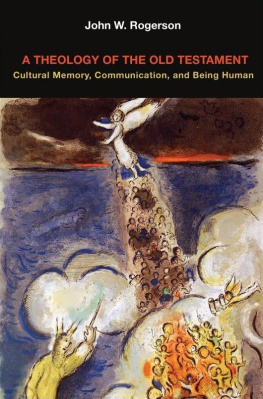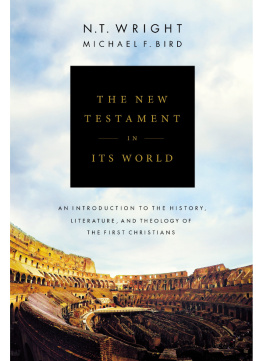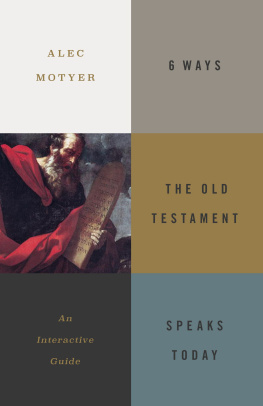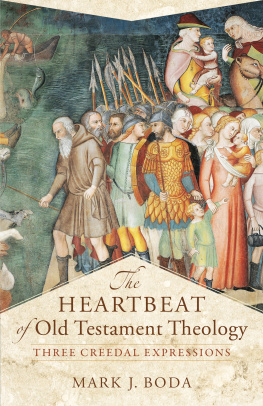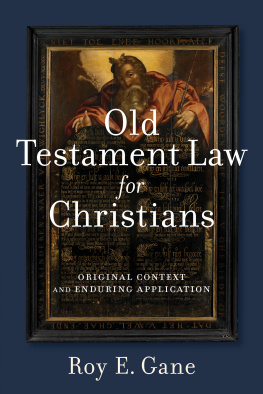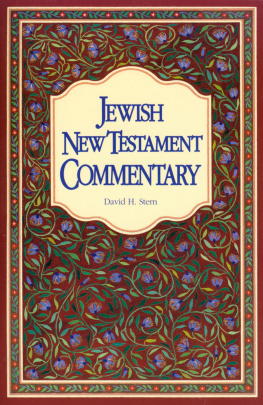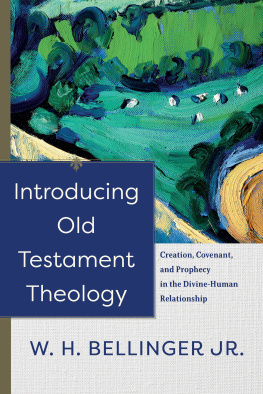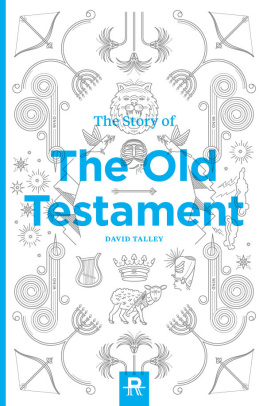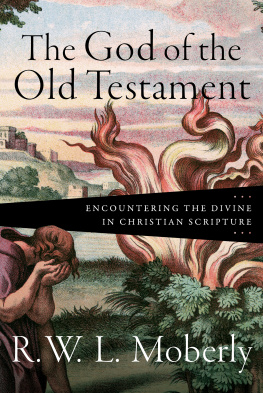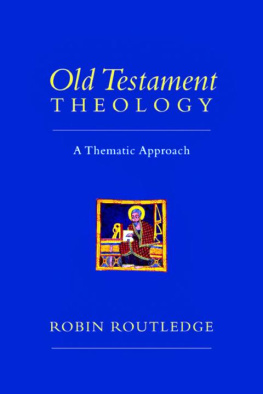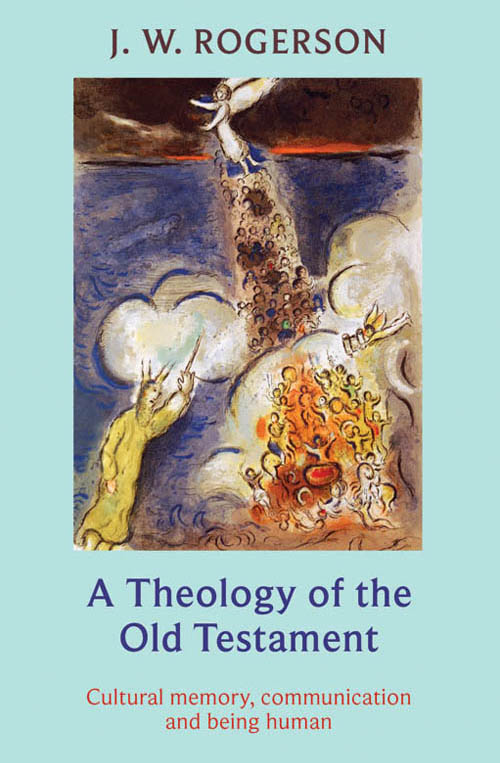Professor Rogerson has taken up Old Testament theology in a stunningly fresh and new way that breaks from much that has gone before. He readily accepts the task of reading the text in and for its twenty-first-century contemporeneity, and takes as his conversation partners the best of current intellectual work, notably the Frankfurt School and especially Jurgen Habermas. A primary aim of the book, beyond the usual suspects in Old Testament theology, is to reach members of the general public to show that the more humane humans become the closer they become to what the Old Testament calls the image of God. His effort is a daring one, sure to engage both his peers in the field and a broader readership among those who care about the future of the world.
Walter Brueggemann, Professor Emeritus, Columbia Theological Seminary
John Rogersons A Theology of the Old Testament shows how the Old Testament can address modern concerns with theological sophistication. This is no antiquarian study, but a lively modern reading of the biblical text, in the light of a concern for how we can change the world, not merely understand it. It will find many sympathetic readers.
John Barton, Oriel and Laing Professor of the Interpretation of Holy Scripture, University of Oxford
J. W. Rogerson is Emeritus Professor of Biblical Studies, University of Sheffield and a Canon Emeritus of Sheffield Cathedral. His main books include Myth in Old Testament Interpretation (1974), Old Testament Criticism in the Nineteenth Century: England and Germany (1984), W. M. L. de Wette, Founder of Modern Biblical Criticism: An Intellectual Biography (1992), The Bible and Criticism in Victorian Britain: Profiles of F. D. Maurice and William Robertson Smith (1995) and An Introduction to the Bible (1999, 2nd edn 2005). He also edited The Oxford Illustrated History of the Bible (2001) and (with Judith M. Lieu) The Oxford Handbook of Biblical Studies (2006).
A THEOLOGY OF THE OLD TESTAMENT
Cultural memory, communication and being human
J. W. ROGERSON
To the Theological Faculties of the
Friedrich-Schiller-Universitt, Jena, and
the Albert-Ludwigs-Universitt, Freiburg im Breisgau,
in grateful acknowledgement of the conferral of the
degrees of Doktor der Theologie, honoris causa
First published in Great Britain in 2009
Society for Promoting Christian Knowledge
36 Causton Street
London SW1P 4ST
Copyright J. W. Rogerson 2009
All rights reserved. No part of this book may be reproduced or transmitted in any form or by any means, electronic or mechanical, including photocopying, recording, or by any information storage and retrieval system, without permission in writing from the publisher.
SPCK does not necessarily endorse the individual views contained in its publications.
Scripture quotations are translated by the author.
British Library Cataloguing-in-Publication Data
A catalogue record for this book is available from the British Library
ISBN 9780281058754
eBook ISBN 9780281063031
1 3 5 7 9 10 8 6 4 2
Typeset and eBook by Graphicraft Limited, Hong Kong
Contents
More than twenty years have passed since Judith Longman, then of SPCK, suggested that I should write an Old Testament Theology, and gave me a contract to do this, with a deadline considerably shorter than twenty years later! There are various reasons why it has taken the project so long to be completed, and completed in a way quite different from how I originally envisaged it. My first priority was to complete the biography of W. M. L. de Wette on which I had begun serious work in 1985. This took me until early 1991, although the task of dealing with proofs, indexes and lists of de Wettes publications and letters, prior to the publication of the book in 1992, was also very time-consuming. I then had invitations to deliver special series of lectures the F. D. Maurice Lectures in London in 1992, six Gifford Lectures in Aberdeen in 1994, and the Prideaux Lectures in the University of Essex in 1998. I suppose that I could have declined these invitations on the grounds that completing my Theology was more im-portant, but apart from not being very good at saying no, there was the fact that I had no clear idea in my mind of how I was going to tackle the task of writing an Old Testament Theology. This was in spite of (or perhaps, because of) the fact that I had spent three months at the end of 1994 in Gttingen reading all the Old Testament theologies or their equivalents that I could find that had been published in German in the nineteenth century.
To cut short what could be a long story, I felt that the time to stop prevaricating had come when, in 2004, I received an invitation to deliver the 2006 Thomas Burns Lectures at the University of Otago in Dunedin, New Zealand. There were six lectures to be delivered over the course of two weeks in the August of that year, and I decided that they must become the basis for the Theology. It would also be an opportunity to get the reactions of colleagues to what I was trying to do. The lectures were delivered under the title A Communicative Theology of the Old Testament and I should like to record my thanks to Professor Paul Trebilco and his colleagues for the invitation and for making the time in Dunedin so enjoyable and profitable.
The present work is a complete rewriting and enlargement of the lectures, although following their basic scheme. Something should be said, first, about the term communicative. This term was key to the lectures and remains key throughout this book. It has, as reviewers may wish to point out, been used in the present work in a somewhat elastic way. It is a slippery term in any case, as Luhmann has pointed out. as well as to my reading of Luhmann, and his use of systems theory. But its main thrust in the present work is twofold. First, it helps to emphasize that the purpose of the book is not to try to reconstruct the religious ideas that may have been held in ancient Israel and which were expressed in the Old Testament. Although an Old Testament Theology cannot avoid dealing with the past as the matrix from which the Old Testament emerged, the present work is concerned above all with todays world. It is an attempt to let parts of the Old Testament speak to the concerns of present-day readers. The term communicative is meant to try to convey this. Second, communicative serves as a theme around which certain topics can be organized, most notably in the chapters about disrupted communication in social relationships and divinehuman relationships.
One of the most helpful observations made (by Dr M. E. Andrew) on the lectures in Dunedin was that they dealt extensively with actual passages from the Old Testament as opposed to relegating it to numerous references to the subjects being discussed. It was always my intention to try to let the texts speak, so to say, and I was thus glad of the encouragement given to me by Dr Andrew on this score. In the present work the space devoted to the exegesis of passages from the Old Testament has been considerably expanded. The translations are my own, and readers will notice that I have accepted many scholarly suggestions about emending the traditional Hebrew text. I hope that experts in Hebrew will be able to understand my transliterations. When I see transliterated Hebrew it often takes me some time to work out what the underlying Hebrew in fact is! I am also aware that extremely sophisticated transcriptions of the Hebrew have been undertaken by members of the Richter school, based upon modern linguistics. What I have tried to do is to give an oral version of the Hebrew as it would be pronounced, roughly, in modern Israeli Hebrew pronunciation, and given that modern word-processors do not have all the diacritical marks that one would like. I hope that Hebraists will be able to see what I have done, whether or not they agree with my conclusions.

